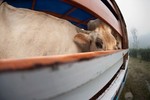
“Fifty-nine animals fell during the transportation of 3,314 head of cattle, received aboard the Pearl of Para, from the Novorossiysk port. During the quarantine at the farms of the recipients that followed, another 160 animals fell and veterinary specialists had to slaughter 108. Due to extreme exhaustion, 665 cattle will have to be slaughtered shortly. Thus, the Russian farmers actually received 1,000 head fewer of breeding cattle,” said the report from Rosselkhoznadzor.
Officials noted that this was not the first violation of veterinary standards and rules of transportation of animals by veterinary services and suppliers from the US.
“It should be noted that Rosselkhoznadzor has been repeatedly requested by Russian consignees to investigate other violations detected during the supply of breeding cattle from the US. These violations include supply of animals in ships and containers unsuitable for this purpose, resulting in the deaths, injuries and loss of productivity from imported livestock. As a result, the Russian consignees have suffered significant financial losses,” said Rosselkhoznadzor press secretary Alexei Alekssenko.
Rosselkhoznadzor said the current situation called for urgent consultations with the American Veterinary Service (APHIS), with agreement needed on a list of measures to strengthen control over the transportation of animals.
“If the US authorities take a non-constructive position, Rosselkhoznadzor will be forced to introduce temporary restrictions on imports of US breeding cattle by sea,” concluded the official statement.
Tightening control
Russia has threatened to introduce import restrictions on a number of countries and suppliers recently, claiming that exporters are not meeting veterinary standards. Rosselkhoznadzor recently announced plans to tighten the system of control for all meat imports, requesting prior notice of veterinary certificates.
“From now on, for imports to the territory of the Customs Union by sea, veterinary control for meat (beef, pork, lamb, horse, poultry) and fish will be carried out only with prior notification of the veterinary certificate for the corresponding load,” said the agency.
Alexeyenko said the system of prior notification of veterinary certificates was already in use, but was only operated temporarily and only in respect to certain countries that were found to be violating veterinary rules. Now, it will be applied permanently to imports from all countries.





